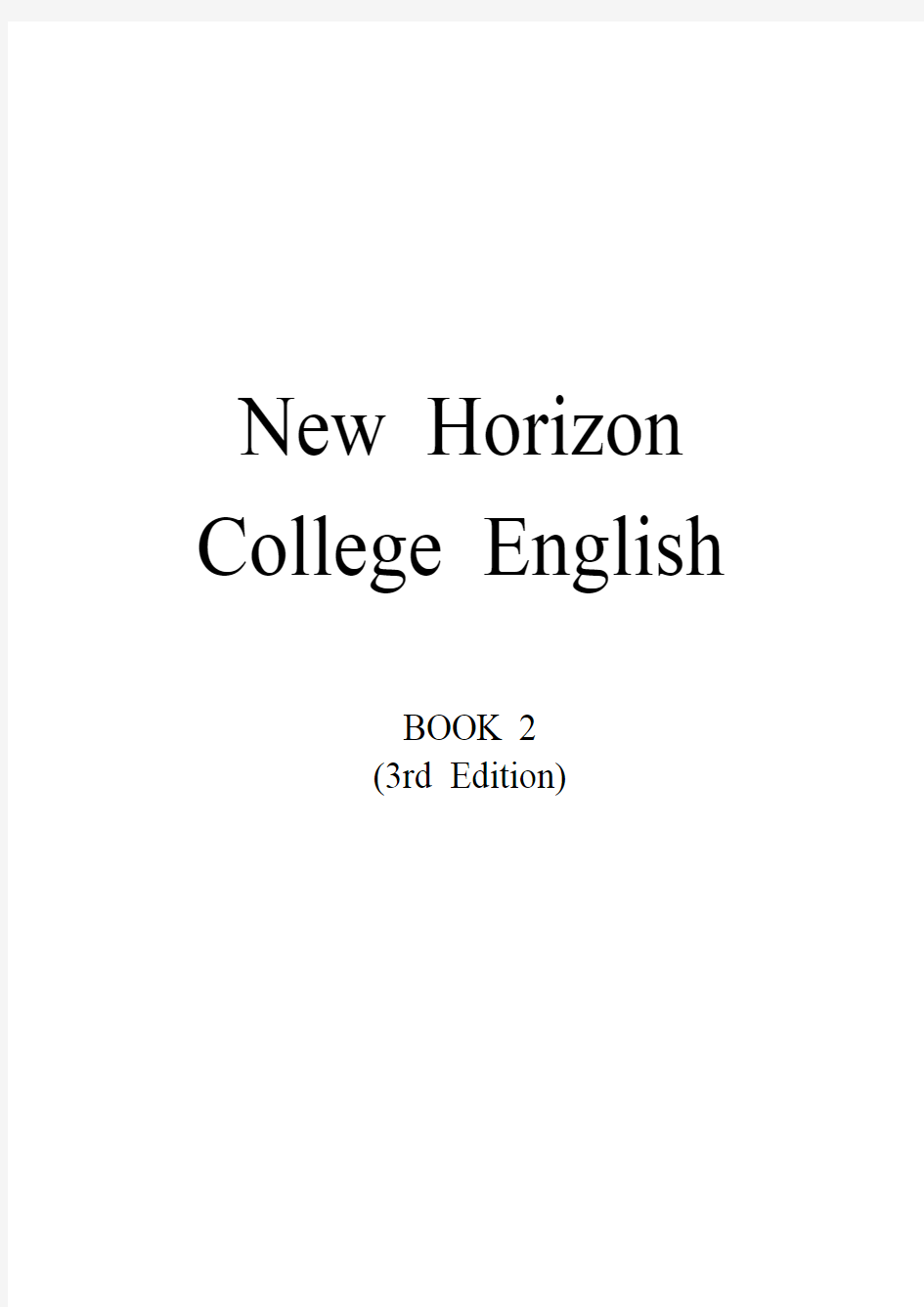
新视野大学英语(第三版)读写教程第二册教案完整版
- 格式:docx
- 大小:107.58 KB
- 文档页数:62


New Horizon College English
BOOK 2
(3rd Edition)
Unit 1 An Impressive English Lesson
课型:□ 理论课√ 理论、实践课□ 实践课
课时分配:6
教学环境:多媒体教室
教学目标:
After studying this unit, the students are expected to be able to:
1. understand the main idea and structure of Section A and Section B;
2. master the key language points and grammatical structures in the texts
3. talk about language teaching and learning and express their opinions about current way of teaching in an English class;
4. read with the skill ―finding key ideas in sentences;
5. write a composition with three main parts: introduction, body and conclusion.
Key Issues:
1. Vocabulary
Tedious, absorbed, allergic, capture, condense, exceed, distinguish, distinctive, complimentary, complementary, proclaim, evidently, adequate, competent, adjust, beneficial
2. Skills
Learn to read with the skill ―finding key ideas in sentences and write a composition with three main parts: introduction, body and conclusion.
Potential Problems and Difficulties
●To talk about language teaching and learning
●write a composition with three main parts: introduction, body and conclusion.
●To apply the phrases and patterns
Methodology:
A combination of traditional teaching methods with the communicative approach will be adopted. Special attention should be paid to classroom interaction like questioning and answers. Small group works are always needed while discussing the questions and the difficult translation practice. More encouragement is needed and more guidance will be given in their extracurricular study.
Teaching Aids: Visual aids, projector, stereo and microphone
Group work and pair work
Conduct of Tasks and Activities
(师生互动方式Mode of Interaction; 学习策略Learning Strategies)
Students-centered, Task-based teaching and learning
Teaching Procedures
Step 1 Lead-in
I. Greeting and warming-up questions discussion.
1. What are the key factors that help people learn English as a foreign language?
2. Do you have any problem in English learning?
3. Do you think grammar is important in English learning?
II. Listening and discussing.
1. Listening practice.
2. In your opinion, what is the most effective way to learn English?
III. Listening to a talk and answer questions on page 2
Step 2 Section A An Impressive English Lesson
I. Cultural background American university education
1.What is Communicative Language Teaching?
A type of teaching method;
Develop the communicative ability as well as the knowledge of grammar; Learning by doing;
Make classroom situation of real foreign language environment.
2. What are the features of Communicative Language Teaching?
Communicative competence is the goal;
An integration of grammatical and functional teaching;
Accuracy is secondary to conveying a message;
Focus on communicative and contextual factors in language use;
Learner-centered and experience-based.
3. What is the role of teacher in Communicative Language Teaching?
A facilitator of students’ learning;
A manager of classroom activities;
An advisor of students’ questions;
A co-communicator in the communicative activity.
II. Language Points
Words and expressions
1. oddity: n. [C] a strange or unusual person or thing 怪人;怪物;奇特的东西With his neat suits on, he felt like an oddity walking in this poor neighborhood. 穿着笔挺的西装走在这个贫民区里,他觉得自己就像个怪物。
2. oblige
The word oblige is most commonly used in the expression be/feel obliged. 1) be/feel obliged to do sth. 指“感到有责任做某事”。
例如:He felt obliged to help his mother, even if it meant leaving college. 他觉得有责任帮助母亲,即使这意味着他要离开大学。
2) be/feel obliged to sb./sth. 指“对某人或某事心存感激”。
例如:Thank you very much, doctor. I am extremely obliged to you. 医生,非常谢谢您。对您,我深表感谢。
3. How was it? (spoken) often used in conversation to ask sb. about their opinion or experience of sth. 怎么样?(口语常用表达,用于询问看法或经历)Did you watch the movie last night? How was it? 你昨天晚上看那部电影了吗?感觉怎么样?
I was told that you had traveled to many places in Asia recently. How was it? 有人